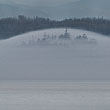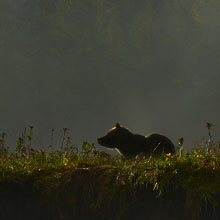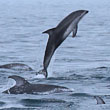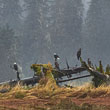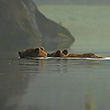Availability: Limited Edition Print - info coming soon!
In the Field
The Ethereal Great Bear Rainforest. Great Bear Rainforest (on northern BC Coast), BC, Canada. October 2, 2011.
One of my favourite animalscapes* from 2011...
One of the things I love best about being a professional nature photographer is that it forces you to spend long hours in the wilderness. And, in time, you get to see some pretty amazing things. Like this scene - to me it was not only breath-taking, but it literally embodies the essence of one of our planet's most special places - the large tract of intact temperate rainforest on the coast of British Columbia that has become known as The Great Bear Rainforest. Absolutely ethereal...
I captured this image during a moody, foggy morning in the autumn of 2011. We had been watching a female grizzly and her cub digging for roots along an edge of a river at the end of a long coastal inlet. The sun had just come up and was beginning to slowly reveal the many layers of lichen and fog-laden trees that make up the rainforest. This scene was changing second-by-second as the mist drifted through. I shot dozens of images of the scene but this one, with the mother bear silhouetted and rim-lit while standing along the edge of the river bank and with the background forest being gently kissed by the soft light, is by far my favourite.
This image wasn't unduly difficult to capture - it was primarily a matter of exposing correctly for the highlights on the bear (meaning ensuring that the highights weren't lost). However, to get the background just right in the final image (and as close to I remember it looking while in the field) took a significant amount of work during post-processing, mostly to separate out the subtle mid-tone details in the background trees. I needed to use a combination of techiques, including exposure blending, selective curves adjustment (using luminosity masking techniques), and tone tweaking using a product called LightZone before I could get the image "just right"!
There are few places left on the planet that are virtually untouched or unaffected by man and still in what we think of as a pristine state. While it would be stretching things to call the Great Bear Rainforest completely untouched, it is exceptionally unique in that it is the largest "intact" tract of temperate rainforest left on the planet (intact in that all species that historically found within the ecosystem are still present). Unfortunately, the Great Bear Rainforest now faces a new and ominous threat. There is a proposal to bring oil super-tankers through the narrow and treacherous channels of the Great Bear Rainforest. Any mishap - such as the one that sunk the Queen of the North ferry on March 22, 2006 - could result in an oilspill with disasterous consequences.
Like many animalscapes, this image is best appreciated when see LARGE! So here's a 2400 pixel version of it:
• The Ethereal Great Bear Rainforest: Download 2400 pixel image (JPEG: 1.0 MB)
ADDITIONAL NOTES:
1. This image - in all resolutions - is protected by copyright. I'm fine with personal uses of it (including use as desktop backgrounds or screensavers on your own computer), but unauthorized commercial use of the image is prohibited by law. Thanks in advance for respecting my copyright!
2. Like all wildlife photographs on this website, this image was captured following the strict ethical guidelines described in The Wildlife FIRST! Principles of Photographer Conduct. I encourage all wildlife photographers to always put the welfare of their subjects above the value of their photographs.
3. This image was captured during one of my "Into the Great Bear Rainforest" photo tours during the autumn of 2011. Each year I offer trips into two different parts of the Great Bear Rainforest as well as one to photograph aquatic mammals and oceanscapes near the northern tip of Vancouver Island. And, in selected years, I also offer photo tours to locations to capture other highly sought-after subjects, such as various owl species of the boreal forest and wildlife of Canada's Arctic. Details about these trips can be found on the Photo Tours page of this website.
*4. For a more detailed discussion of the image types I call animalscapes and enviroscapes (and the subtle distinctions between them), just go here...
5: Alert - Digitally Manipulated Image: This image clearly crosses the line from simple digital correction to digital manipulation. In the case of this image, I digitally removed (using the clone tool) a leafy plant that was overlapping the bear's chin and cheek region.
It is my policy to clearly identify ANY images on this website that overstep the bounds of digital correction and enter the territory of digital manipulation (see Voice: Commentary: Digital Correction vs. Digital Manipulation).
Behind the Camera
The Ethereal Great Bear Rainforest. Great Bear Rainforest (on northern BC Coast), BC, Canada. October 2, 2011.
Digital Capture; Compressed RAW (NEF) 14-bit format; ISO 100
Nikon D7000 with Nikkor 70-200mm f2.8 VRII lens - handheld. VR on and in "Active" mode.
1/400s @ f6.3; -0.33 stop compensation from matrix-metered exposure setting.
At the Computer
The Ethereal Great Bear Rainforest. Great Bear Rainforest (on northern BC Coast), BC, Canada. October 2, 2011.
RAW Conversion to 16-bit TIFF, including first-pass/capture sharpening using Phase One's Capture One Pro 6. Two exposure variants covering a 0.5 stop total range.
Further digital corrections on resulting 16-bit TIFF files using Adobe's Photoshop CS5 and Light Craft's LightZone. Photoshop adjustments including compositing (layering and masking) the exposure variants, selective colour desaturation, selective curves adjustment (using luminosity masking techniques) and selective sharpening for web output. Final contrast/tone tweaking - particularly to mid-tones - performed with LightZone using the tonemapper/re-light tool.
Conservation
The Ethereal Great Bear Rainforest. Great Bear Rainforest (on northern BC Coast), BC, Canada. October 2, 2011.
Ten percent of the revenue generated by this image will be donated to Raincoast*.
Species Status in Canada**: Special Concern (May 2002).
While Grizzly Bears (Ursus arctos) are not technically listed as "Endangered" in Canada, they have been extirpated from most of their historical range. Grizzly Bears are far more sensitive to intrusion/disturbance in their habitat than are Black Bears and are being increasingly forced into marginal habitat by human encroachment. The Great Bear Rainforest along the central and northern coast of British Columbia is one of the last strongholds of the Grizzly Bear in Canada, and even this population is coming under increasing pressure.
On December 18, 2017 the government of British Columbia banned grizzly hunting across the entire province. This major conservation victory came after decades of tireless work by many dedicated conservationists and ecologists and, most importantly, it reflects the opinion of the vast majority of British Columbians. And, it means that AT LEAST while the current government remains in power grizzlies are finally "safe" in British Columbia.
Now that we've at least temporarily won the battle to save grizzlies in BC, it's time to re-focus our efforts toward protecting ALL of BC's carnivores, including Gray Wolves, Black Bears, Cougars, Wolverines, and more! Simply put, there are no ecological, economic, or ethical arguments supporting the trophy hunting of carnivores.
In a great first step towards ending the hunting of carnivores throughout BC the Raincoast Conservation Foundation has developed a program designed to protect ALL carnivores within the Great Bear Rainforest. Details about this program can be found on this page on Raincoast's website. Check it out and, better yet, make a donation to help Raincoast purchase the remaining commercial hunting tenures in the Great Bear!
*The Raincoast Conservation Society (and Foundation) is an effective and efficient organization that has been fighting for protection of this unique habitat. If you are looking for a meaningful way to contribute to the conservation of this amazing ecosystem, Raincoast will provide maximal "bang" for your conservation dollars.
**as determined by COSEWIC: The Committee on the Status of Endangered Wildlife in Canada




















